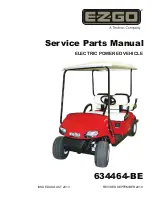
OPERATION AND SERVICE INFORMATION
Page 25
Owner’s Guide
Read all of manual to become familiar with this vehicle. Pay attention to all NOTICES, CAUTIONS, WARNINGS and DANGERS.
B
B
BATTERY CHARGING
The battery charger is designed to fully charge the bat-
tery set. If the batteries are severely deep cycled, some
automatic battery chargers contain an electronic module
that may not activate and the battery charger will not
function. Automatic chargers will determine the correct
duration of charge to the battery set and will shut off
when the battery set is fully charged. Always refer to the
instructions of the specific charger used.
Before charging, the following should be observed:
Do not overfill batteries. The charging cycle will expel
electrolyte and result in component damage.
• The electrolyte level in all cells must be at the rec-
ommended level and cover the plates.
• The charging must take place in an area that is
well ventilated and capable of removing the
hydrogen gas that is generated by the charging
process. A
minimum
of five air exchanges per
hour is recommended.
• The charging connector components must be in
good condition and free from dirt or debris.
• The charger connector must be fully inserted into
the vehicle receptacle.
• The charger connector/cord set is protected from
damage and is located in an area to prevent
injury that may result from personnel running over
or tripping over the cord set.
• The charger is automatically turned off during the
connect/disconnect cycle and therefore no electri-
cal arc is generated at the DC plug/receptacle
contacts.
In
some
portable chargers, there will be a rattle present in the
body of the charger DC plug. This rattle is caused by an inter-
nal magnet contained within the charger plug. The magnet is
part of the interlock system that prevents the vehicle from
being driven when the charger plug is inserted in the vehicle
charging receptacle.
TROUBLESHOOTING
In general, troubleshooting will be done for two distinct
reasons. First, a battery that performs poorly and is out-
side of the manufacturers specification should be identi-
fied in order to replace it under the terms of the manu-
facturer’s warranty. Different manufacturers have differ-
ent requirements. Consult the battery manufacturer or
the manufacturer’s representative for specific require-
ments.
The second reason is to determine why a particular ve-
hicle does not perform adequately. Performance prob-
lems may result in a vehicle that runs slowly or in a vehi-
cle that is unable to operate for the time required.
A new battery must
mature
before it will develop its
maximum capacity. Maturing may take up to 100
charge/discharge cycles. After the maturing phase, the
older a battery gets, the lower the capacity. The only
way to determine the capacity of a battery is to perform
a load test using a discharge machine following manu-
facturer’s recommendations.
A cost effective way to identify a poorly performing bat-
tery is to use a hydrometer to identify a battery in a set
with a lower than normal specific gravity. Once the par-
ticular cell or cells that are the problem are identified,
the suspect battery can be removed and replaced. At
this point there is nothing that can be done to salvage
the battery; however, the individual battery should be re-
placed with a good battery of the same brand, type and
approximate age.
Fig. 31 Hydrometer
HYDROMETER
A hydrometer is used to test the state of charge of a bat-
tery cell. This is performed by measuring the density of
the electrolyte, which is accomplished by measuring the
specific gravity of the electrolyte. The greater the con-
centration of sulfuric acid, the more dense the electro-
lyte becomes. The higher the density, the higher the
state of charge.
NOTICE
Summary of Contents for RXV Fleet Freedom Shuttle 2+2
Page 1: ...REVISED JULY 2014 ISSUED FEBRUARY 2009 ...
Page 47: ...Page 27 Owner s Guide GENERAL SPECIFICATIONS GENERAL SPECIFICATIONS ...
Page 55: ...Page 35 Owner s Guide DECLARATION OF CONFORMITY DECLARATION OF CONFORMITY EUROPE ONLY ...
Page 56: ...Page 36 Owner s Guide DECLARATION OF CONFORMITY ...
Page 57: ...Page 37 Owner s Guide DECLARATION OF CONFORMITY ...
Page 58: ...Page 38 Owner s Guide DECLARATION OF CONFORMITY Notes ...



































